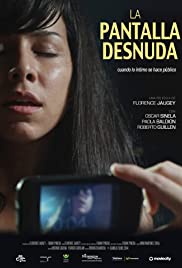
LA PANTALLA DESNUDA/ THE NAKED SCREEN
Nicaragua, 2014, 90 minutes, Colour.
Oscar Sinela, Roberto Guilen, Paolo Baldion.
Directed by Florence Jaugey.
The title of the film sounds rather sensationalist – but, in fact, the sex scenes, while significant for the plot of the film, are fairly minimal visually.
This is a cautionary tale about social media, about the trend to photograph and film oneself and others sexually and to distribute the images – with some dire consequences for the individuals and life after the social media experience.
Interestingly, this is a film from Nicaragua, an opportunity to see a Nicaraguan story with Nicaraguan characters (although the director and the central character are French and Spanish).
The plot is straightforward but arresting, two young men at university, becoming friends, one from a rich background with a dominating father and the son rebelling in terms of career demands as well as ideology of hunting and violence, the other from a poor background but fabricating stories about his past. The rich son is in a relationship with a student and, on impulse, photographs and videos her, especially, during a sexual encounter. She has been unwilling.
The friend is something of a young Iago figure, the film not spelling out what his motivations are, some envy of his rich friend, some jealousy of the girl, perhaps some sexual attraction for the man.
The film is strong on showing the reaction to the circulating video, the amount of curiosity and number of viewers, the reaction of people to the man, less condemned, the often vicious and eventually violent reactions to the young woman and her being considered a slut.
The young man tries to do the right thing by his girlfriend and to support her in her humiliation. However, his seeming friend continues to conspire even to ruin the possibility of the two leaving the town for a different life.
In the picture are the parents of the rich young man, the mother of the girl who works in a copy and communication shop where people cease to come and where graffiti is painted on the wall, and the mother of the jealous young man, a seamstress, who uncovers what her son has been doing.
This is a film where the audience would have liked the screenplay to continue further but it simply shows what has happened to the three characters and leaves it for the audience to speculate on what will happen.
1. The title and expectations? Sexuality? Communications?
2. The film from Nicaragua? The settings, the town, streets and highways, homes, rich and poor, the University, the buyers, the pool rooms? The musical score?
3. The 21st-century focus on social media, smart phones, photos and videos, texting, messages, uploading videos, spreading them?
4. The film’s comments on viewers of the sex videos? Curiosity? Making allowances for the man? Victimising the woman? The lewd comments, the ridicule, the gossip, the condemnations yet indulgence? Graffiti and people mocking the girl with the quote, now, now?
5. The introduction to the central characters? Alex, from the rich family, his father wanting him to be a man not a wimp, support from his mother? Octavio, the poor background, his mother, brother, at home? Esperanza, her mother and the copying and communication shop, studies?
6. Octavio, at home, getting dressed, his mother, the meals, treatment of his mother? The good treatment at Alex’s parents? His going hunting, the shooting? Friendship with Alex, the telling of his family story, the death of his father, the loss of the property, family difficulties – and the family raising difficulties about the truth? Studying, his scholarship, the threats from the lecturer? His attitudes towards Alex, friendship, envy, the role of Esperanza, taking Alex away from him? The discussions about the relationship? The game of pool, the drinking, the bet,
Octavio unable to pay, his taking the phone, watching it at home, his decision to send out the images, watching the number of viewers? His secrecy? Alex’s visit and his pretending to know nothing? The ceremony and not wanting his mother to go, her presence? His preoccupation with the phone, the images? The episode with his cutting his T-shirt? His mother going through his cupboards, discovering the truth, wanting to protect him? His going to farewell Alex? His malice in texting Esperanza and telling her the wrong time for the meeting?
7. Alex, his relationship with his parents, resentful of his father, his father’s domination, hunting, Alex’s arguments against hunting and violence? Friendship with Octavio? The relationship with Esperanza, meeting her, the sexual encounter, filming it? The pool game, drinking, losing his phone, becoming desperate, the revelation of the truth, his friends unable to help? Going to Esperanza, talking with her, her forgiving him? The plan to leave the town, packing, Octavio getting the message and changing it?
8. Esperanza, her relationship with Alex, her relationship with her mother, the sexual encounter, asking him not to film? The consequences, people watching, the visit to the toilet and the girls’ comments, in the street, condemned as a slight? In class? Are being hurt, talking it over with her mother? Preparing to leave, the wrong time, waiting, two men, the abuse and throwing
her out, injured?
9. The parents, Alex’s father and his haughtiness? Demanding his son continue the business and the traditions? Esperanza’s mother, her work in the shop, business declining, the graffiti? Octavio’s mother, servant, dressmaker, love for her son, going to the ceremony, discovering the truth?
10. The film’s comments on people and their reaction to social media, curiosity, hostility and malevolence?
11. The film as a cautionary tale about social media privacy, reputations and invasions of privacy?